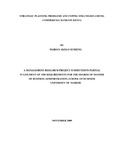| dc.description.abstract | Strategic planning can be defined as a set of procedures for making decisions about the organization‟s long term goals and strategies. Strategy on the other hand can be said to be a pattern of actions and resource allocations designed to achieve the organization‟s goals. Strategic planning activity is the tool for operationalization of an organization‟s march towards its vision. An efficient strategic plan enables the organization to effectively manage environmental change and sustain its competitive advantage in the market. It also helps in optimum utilization of limited available resources and in improving corporate communications for its competitive advantage. Strategic planning involves making decisions about the organization‟s long-term goals and strategies. Strategic plans have a strong external orientation and cover major portions of the organization. The data was collected between January and March 2009 from thirty respondents. The objectives of this study were; to identify the strategic planning problems faced by commercial banks in Kenya and to determine the coping strategies adopted by commercial banks in Kenya for the strategic planning problems A survey design was used in this study. The target population was 47 commercial banks in Kenya. The researcher sampled thirty three commercial banks, which were chosen using stratified random sampling method. The data was collected using semi-structured questionnaire and then it was coded and entered into a spreadsheet and analyzed using SPSS (Statistical Package for Social Sciences and presented using frequencies, percentages and frequency tables. From the findings, the researcher found that commercial banks in Kenya experience problems in the strategic planning. These problems were such as risks associated with loans to the customers, inadequate knowledge by the staff, inadequate employee, lack of enough customers and operation strategies that were old and outdated. It was also found that in order to deal with the problems of strategic planning, the banks trained their staff, reviewed the previous operation strategies which were old and outdated, collateral check-ups, scrutiny of the guarantors, giving more information to the department by the organization on various issue e.g. market analysis, financial analysis etc. other approaches included, spreading wings by opening new branches, increasing the capital base and lending facilities, getting the appropriate strategic plan, intensive market research on this area and employing more qualified staff especially who had adequate knowledge on areas such as information technology.
viii
The outcome of the research provides pertinent information on the extent of the effectiveness of strategic planning by commercial banks in Kenya as well as developing and adopting coping strategies suitable for the changing and competitive environment. It also provide suggestions on how to enhance the choice of planning methods in response to the strategic planning problems experienced in the banking industry and ensure that the plans are incorporated in policy making and serve as a guide to the bank‟s general operations. The implication of the study is that commercial banks in Kenya have to continuously review the strategic plans to ensure that they are within their goals and the plans remain relevant to the commercial environments in which they operate. | en |

